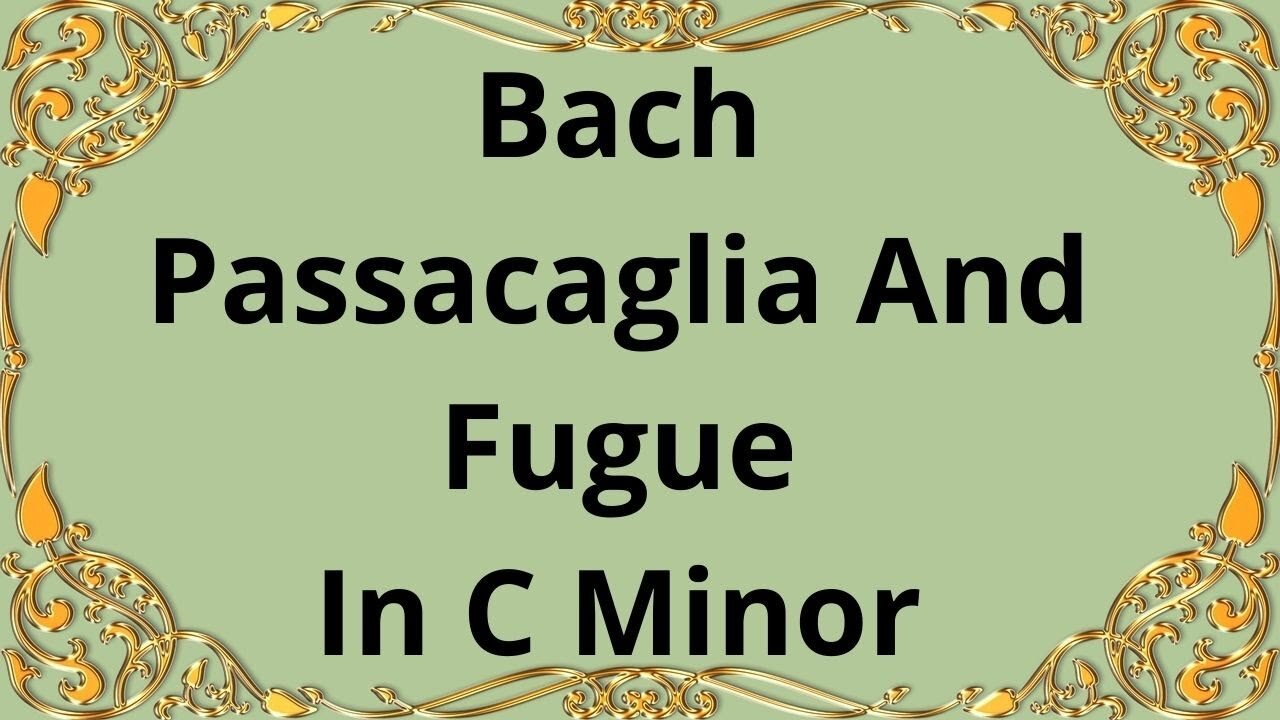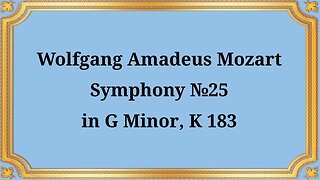Premium Only Content

Bach Passacaglia And Fugue In C Minor
#classical_music #Bach #Passacaglia
Johann Sebastian Bach, a towering figure in the world of classical music, has gifted us with numerous compositions that continue to enthrall and inspire audiences to this day. Among his extraordinary works is the Passacaglia and Fugue in C Minor, a testament to Bach's unparalleled mastery of composition.
Bach's Passacaglia and Fugue in C Minor was composed during his tenure as Kapellmeister in Leipzig, Germany, around the early 18th century. This monumental work represents the pinnacle of Baroque organ music and showcases Bach's mastery of both the passacaglia and fugue forms. While the original purpose or occasion for the composition remains unknown, its immense complexity and emotional depth have earned it a place of prominence in the repertoire of organists worldwide.
Passacaglia: The Passacaglia serves as the foundation of this composition. It is built upon a repeating bass line, known as a ground bass or ostinato, which provides the structural framework for the entire piece. Bach's brilliance shines as he develops a series of variations above this repeating bass line, exploring different musical ideas, harmonies, and textures. The Passacaglia showcases Bach's ability to create a rich and diverse musical landscape while maintaining a strong sense of unity.
Fugue: Following the Passacaglia, Bach introduces a fugue—a contrapuntal composition built on the interplay of multiple voices. The fugue in C minor is a tour de force of intricate counterpoint, with multiple melodic lines weaving together in a complex and harmonically rich tapestry. Bach's precise and intricate voice leading creates a sense of both grandeur and intellectual depth.
Bach's Passacaglia and Fugue in C Minor continues to captivate and inspire musicians and listeners alike. Its profound emotional depth, technical complexity, and spiritual grandeur make it a timeless masterpiece. Organists in particular have embraced this composition as a pinnacle of their repertoire, drawn to its expressive power and the technical challenges it presents.
Moreover, Bach's Passacaglia and Fugue in C Minor has had a profound influence on subsequent generations of composers. Its intricate counterpoint and harmonic progression have served as a source of inspiration for composers from the Classical, Romantic, and even modern periods. The composition's enduring appeal lies in its ability to evoke a wide range of emotions, from solemnity to jubilation, while maintaining a sense of transcendent beauty.
Johann Sebastian Bach's Passacaglia and Fugue in C Minor stands as a testament to the composer's extraordinary talent and artistic vision. This monumental composition, with its powerful Passacaglia and intricately crafted Fugue, showcases Bach's mastery of musical form and his ability to create music that resonates with audiences across centuries. Through its enduring appeal and influence, the Passacaglia and Fugue in C Minor continues to inspire and awe musicians and listeners alike, offering a glimpse into the timeless genius of Johann Sebastian Bach.
-
 16:53
16:53
Classical music_Music Inspiration
28 days agoWolfgang Amadeus Mozart Symphony No. 25 in G minor, K. 183
441 -
 LIVE
LIVE
StoneMountain64
3 hours agoWARZONE LEGEND RETURNS. GHILLIE SUIT $20k TOURNEY.
201 watching -
 2:11:17
2:11:17
Side Scrollers Podcast
5 hours agoINSANE Illegal Migrant Propaganda Xbox Game + Paypal REFUSES To Pay Dev + More | Side Scrollers
28.9K1 -
 DVR
DVR
SportsPicks
3 hours agoCrick's Corner: Episode 72
3.95K -
 30:39
30:39
ROSE UNPLUGGED
1 hour agoMore of Less: Purpose, Discipline & the Minimalist Mindset
6.36K -
 1:02:18
1:02:18
Timcast
4 hours agoDemocrat States Ignore English Language Mandate For Truckers, DoT Vows Crackdown Amid Trucker Mayhem
151K44 -
 1:57:04
1:57:04
Steven Crowder
6 hours agoAdios & Ni Hao: Trump Sends Abrego Garcia to Africa But Welcomes 600K Chinese to America
335K297 -
 3:54:14
3:54:14
The White House
6 hours agoPresident Trump Participates in a Cabinet Meeting, Aug. 26, 2025
54.2K28 -
 1:18:51
1:18:51
Rebel News
3 hours agoCarney's flawed LNG deal, Libs keep mass immigration, Poilievre's plan to fix it | Rebel Roundup
24.9K11 -
 27:39
27:39
Crypto.com
6 hours ago2025 Live AMA with Kris Marszalek, Co-Founder & CEO of Crypto.com
74.9K4